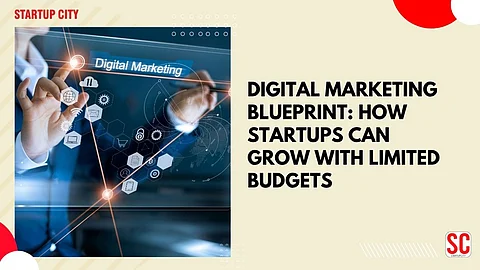

Let me ask you this—what if I told you that some of the most successful startups you admire today didn't begin with deep pockets, but with deep clarity and smarter strategies?
If you're a startup founder, a young CEO, or a budding entrepreneur working with tight margins, I want you to know: you’re not at a disadvantage—you just need the right blueprint.
In my experience advising early-stage ventures, I’ve seen startups explode with growth using digital marketing on shoestring budgets—and I’m going to show you exactly how they did it.
Digital marketing levels the playing field.
You don’t need a 10-crore advertising budget to compete—you need creativity, consistency, and a clear game plan.
Let’s start by understanding why digital marketing is your best ally:
Cost-effective: Campaigns can start from as little as ₹500.
Scalable: You can grow as your revenue grows.
Data-driven: Every click, view, and sale can be tracked and optimized.
Targeted: Speak to your exact customer segment—by location, age, interest, or even behavior.
“It’s not about having resources. It’s about being resourceful.” — Tony Robbins
Let’s break down the blueprint into practical, doable steps that you can implement immediately.
Before you even open Google Ads or Instagram, get brutally clear on these:
Who are you targeting? Be specific—“tech-savvy women founders aged 25-40 in Tier 1 cities.”
What problem are you solving?
Why should they care about your solution?
Tip: Create a 1-sentence value proposition. If you can’t explain what you do simply, your customer won’t get it either.
You don’t need a fancy website to start. But you do need:
Speed: Your site must load in under 3 seconds.
Clarity: Who you are, what you do, and what you want the visitor to do next.
Credibility: Add social proof—testimonials, reviews, case studies.
This is a long-term compounding asset.
Identify long-tail keywords with low competition (use free tools like Ubersuggest or Google Keyword Planner).
Write value-packed blogs that solve your audience’s problems.
Optimize every blog with:
Main keyword in H1, meta title, and first 100 words
Secondary keywords sprinkled naturally
Internal links to your service/product pages
Example: A SaaS startup wrote “How to Manage Remote Teams Without Losing Productivity” and ranked #1 within 3 months—bringing 3,000+ free visitors every month.
You don’t have to be on every platform. Start with one your audience lives on.
Post 3–4 times a week: value, behind-the-scenes, customer wins.
Use reels or carousels—they get 2x more reach.
Interact in DMs and comments—build genuine relationships.
Platform Cheat Sheet:
LinkedIn: B2B startups, consultants, tech founders
Instagram: D2C, lifestyle brands, personal brands
YouTube Shorts: Product demos, explainer videos
Content is compounding equity.
1 blog per week (optimized for SEO)
1 email newsletter per week (build a list from Day 1)
Repurpose: Turn blogs into LinkedIn posts, newsletters, carousels, short videos.
“Content builds relationships. Relationships are built on trust. Trust drives revenue.” — Andrew Davis
Done right, even small-budget ads can explode your visibility.
Use Facebook Lead Ads or Google Search Ads for high intent.
Target lookalike audiences from your email list or website visitors.
Start with retargeting—show ads only to people who already visited your site.
Pro Insight: One B2B startup I advised got 130 qualified leads with just ₹4,000 by targeting startup forums on Facebook.
Big influencers charge big bucks. But micro-influencers (1K–50K followers) often convert better and cost much less.
Find 10–15 niche creators and offer them your product or a small fee.
Collaborate with WhatsApp or LinkedIn communities.
Host free webinars or Instagram Lives with ecosystem partners.
Task
Tool
Cost
Graphic Design
Canva
Free
Social Scheduling
Buffer / Later
Free plans
SEO Research
Ubersuggest / LowFruits
Free to ₹499/mo
Email Marketing
Mailchimp / Beehiiv
Free for <500 subs
CRM & Automation
HubSpot / Zoho
Free tiers available
Am I speaking to my customer or shouting into the void?
Is my content driving value, not just traffic?
What 20% of marketing efforts bring me 80% of results?
If I had only ₹1,000, where would I spend it this week?
Ravi, a 26-year-old founder of a personal finance app, had just ₹15,000 in total marketing budget.
He:
Wrote 10 SEO blogs targeting “saving tips for millennials”
Posted short, relatable reels every day on Instagram
Partnered with 5 finance influencers for barter promotions
Ran a ₹2,000 Instagram retargeting campaign
Result? 15,000+ app installs in 90 days—and investor interest followed.
What’s stopping you from replicating this?
You don’t need more money—you need more intention.
Startups that win with digital marketing are not the ones spending the most, but the ones executing the smartest.
So, take that first blog live. Launch that lead magnet. Reach out to that community leader.
Because if you’re waiting for a big budget to start marketing, you’re already behind.
Choose your primary platform (LinkedIn, Instagram, or YouTube).
Publish your first SEO blog by next week.
Run a ₹500 retargeting ad.
Engage in 3 niche communities this weekend.